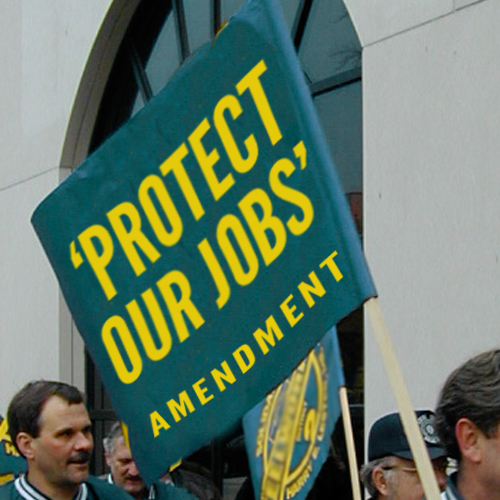Michigan voters defeated the union-backed Proposal 2, with 58 percent voting no and 42 percent voting yes.
“I had full confidence in Michigan voters that they’d see the union power grab for what it was,” said Vincent Vernuccio shortly after the November 6 election results were known. Vernuccio is director of labor policy at the Michigan-based Mackinac Center for Public Policy.
Proposal 2, or the Protect Our Jobs Amendment, would have added union collective bargaining rights to the state’s constitution. This would have turned every collective bargaining session into a “mini Constitutional Convention” and made labor union leaders more powerful than legislators, Vernuccio said.
Greg Mourad, vice president of the National Right to Work Committee, said he expected the proposal to be defeated but was surprised at how soundly it lost.
‘Tired of Forced Unionism’
“The people of Michigan are even more tired of forced unionism than we thought they were,” he said.
Vernuccio noted that even though Proposal 2 was handily defeated, President Barack Obama carried Michigan in his successful bid for re-election.
“This shows that even Obama Democrats would not vote for the union special interest power grab, and that represents a change in the country. Traditional Democrats are no longer rubber-stamping union demands,” he said.
Vernuccio said the proposal’s defeat was good news for Michigan.
“It means that Michigan families have just avoided subsidizing special interests. Michigan workers, Michigan families, Michigan employees, and Michigan taxpayers have avoided losing the $1.6 billion projected savings Proposal 2 would have overruled,” he said.
Savings Were At Risk
A recently passed 80/20 law, which requires government employees to pay for 20 percent of the cost of their own health insurance, easily could have been overturned under the Protect Our Jobs Amendment, if a union had challenged it. Taxpayers then could have been responsible for 100 percent of a government employee’s health insurance.
Under the amendment, a teachers union also could have overruled a law requiring that school officials consider several factors, not just seniority, when deciding which teachers to fire or lay off.
Individuals Still Protected
The amendment would have empowered unions instead of individual workers and prevented any reforms on existing bargaining systems – and prevented the state from passing a right-to-work law, Mourad said.
Under right-to-work laws, union membership cannot be a condition of employment, he said. When workers are permitted to leave unions – and not pay dues – union leaders become more responsive to union workers’ needs. This makes for better unions, he said.
States with right-to-work laws are attractive to companies – and that brings jobs to the state, he said.
“I think this is a pretty clear sign that Michigan is ready for a right-to-work law. That would be great news,” he said. “If they can pass one, it’ll be more jobs, more economic opportunity, and more interest in Michigan, and potentially a revival of Michigan’s economy.”




